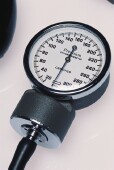
FRIDAY, Aug. 2 (HealthDay News) — Children who have a high blood pressure reading at the doctor’s office typically don’t receive the recommended follow-up blood pressure readings within a month, a large new study finds.
This held true even for children with risk factors for having hypertension.
However, the study also found that when follow-up blood pressure readings were taken, most children’s results had returned to normal.
Researchers analyzed three years of health records from more than 72,600 children and teens, aged 3 to 17, who received blood pressure checks as part of their routine care. They found that about 8 percent of the children had at least one visit with elevated blood pressure, but only 21 percent of those children had another blood pressure check within a month.
Of those with who had a high blood pressure reading, only 1.4 percent went on to develop childhood hypertension. This is defined as having three consecutive high blood pressure readings on three separate days, according to the study published Aug. 1 in the journal Pediatrics.
Even if a child was obese or had stage 2 hypertension, that didn’t have much effect on whether the child received follow-up a blood pressure check within a month after the first elevated blood pressure reading.
“Diagnosing hypertension during childhood is difficult because normal blood pressure for children changes as they age. It’s fairly common for children to have a single elevated blood pressure reading, but when their doctors repeat the test, it appears that most children won’t actually have hypertension,” Dr. Matthew Daley, a researcher at the Institute for Health Research of Kaiser Permanente Colorado, said in a Kaiser news release.
“This tells us that parents should have their children’s blood pressure checked and, if it’s high, rechecked at the same visit,” he explained.
“High blood pressure during childhood can lead to high blood pressure in adulthood,” Daley noted. “And adult cardiovascular disease — including coronary artery disease and strokes — can have its origin in childhood, so diagnosing and controlling hypertension in children is important for their health later in life.”
More information
The U.S. National Kidney Disease Education Program has more about children and high blood pressure.
Copyright © 2026 HealthDay. All rights reserved.

